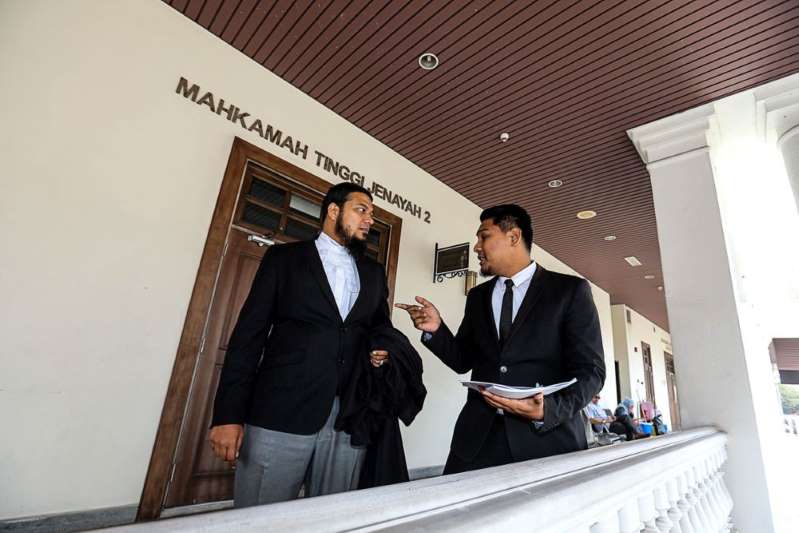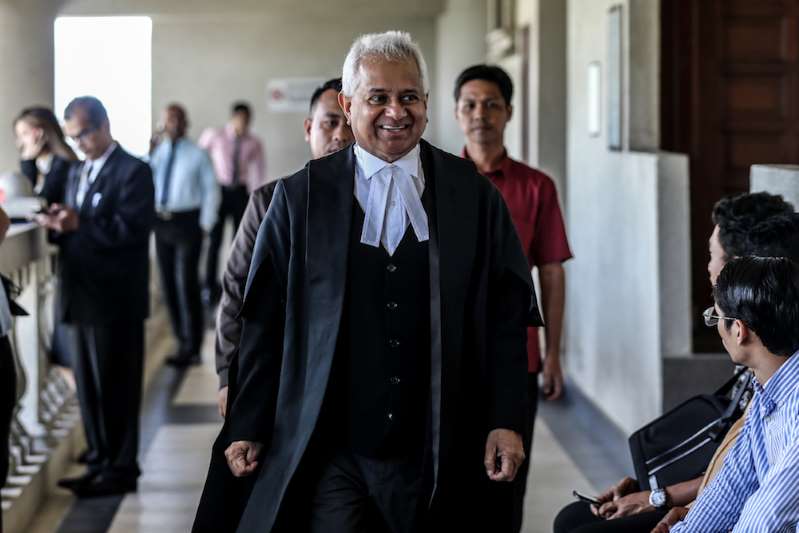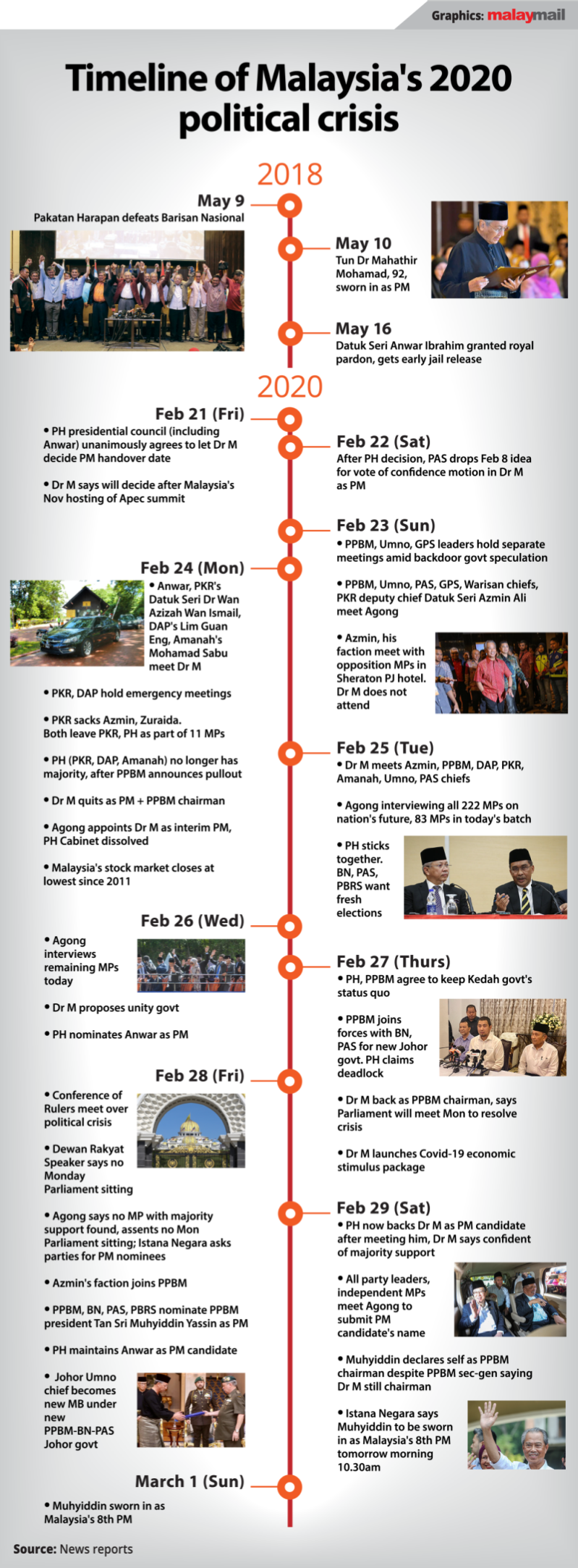Lawyer says Tommy Thomas wrong on Dr Mahathir, argues Cabinet automatically dissolved when PM resigns for any reason

© Provided by Malay Mail Lawyer Muhammad Rafique Rashid Ali however argued instead that the Cabinet would automatically be dissolved whenever a prime minister in Malaysia steps down regardless of the prime minister’s reasons for doing so, citing the Federal Constitution’s Article 43(4). — Picture by Sayuti Zainudin
KUALA LUMPUR, Feb 2 — Former attorney general Tan Sri Tommy Thomas was wrong to say that Tun Dr Mahathir Mohamad’s resignation as prime minister in February 2020 did not mean that the Cabinet under the Pakatan Harapan administration then had to be dissolved, a lawyer argued today.
Lawyer Muhammad Rafique Rashid Ali however argued instead that the Cabinet would automatically be dissolved whenever a prime minister in Malaysia steps down regardless of the prime minister’s reasons for doing so, citing the Federal Constitution’s Article 43(4).
Article 43(4) states that “If the prime minister ceases to command the confidence of the majority of the members of the House of Representatives, then, unless at his request the Yang di-Pertuan Agong dissolves Parliament, the prime minister shall tender the resignation of the Cabinet.”
Rafique was weighing in on Thomas’ memoir My Story: Justice in the Wilderness released three days ago, where Thomas had in the book’s page 472 argued that the Cabinet could still continue on when Dr Mahathir resigned as prime minister on February 24, 2020.
Rafique said that Dr Mahathir had lost the majority support from Dewan Rakyat members on February 24 when Parti Pribumi Bersatu Malaysia and a faction of MPs under Datuk Seri Mohamed Azmin Ali pulled out from Pakatan Harapan.
Rafique argued that this meant that Dr Mahathir could not continue to hold the position of prime minister for the PH administration under constitutional law, and he had to resign unless the Yang di-Pertuan Agong dissolves Parliament at his request.
“Constitutionally, when a prime minister resigns, the whole Cabinet is also dissolved. Whether the resignation was done on the prime minister’s own wishes and will or not, it is not relevant to the position of the Cabinet,” Rafique argued in a statement today.
Rafique argued that even if it was a situation where a prime minister resigns despite still having majority support from MPs — such as Dr Mahathir’s resignation in 2003, such a situation would also not be relevant to the Cabinet’s status.
Rafique instead insisted that the entire Cabinet must be “automatically” dissolved when a prime minister resigns, “regardless of whether the resignation was done due to the loss of majority support of members of the Dewan Rakyat or otherwise, and/or whether on his own wish or otherwise”.
Rafique said that Sabah’s state constitution’s Article 7(1) and Perak’s state constitution’s Article XVI (6) also had similar provisions to the Federal Constitution’s Article 43(4), adding that the effect of these state provisions were seen in three court cases.
He listed the three court cases as Datuk (Datu) Amir Kahar bin Tun Datu Haji Mustapha v Tun Mohd Said bin Keruak Yang Di-Pertua Negeri Sabah & Ors [1995] 1 MLJ 169, Dato’ Seri Ir Hj Mohammad Nizar bin Jamaluddin v Dato’ Seri Dr Zambry bin Abdul Kadir (Attorney General, intervener) [2010] 2 MLJ 285 and Tan Sri Musa Hj Aman v Tun Datuk Seri Panglima Hj Juhar Hj Mahiruddin & Anor and another [2019] 10 MLJ 329.
He said the courts had in those three cases decided that the entire state executive council or state Cabinet is automatically dissolved when a chief minister or mentri besar loses majority support.
“So it is clear that Tan Sri Tommy’s statement as per page 472 is constitutionally erroneous in that it is in contradiction with Article 43(4) of the Federal Constitution,” Rafique claimed when arguing that Thomas had erred in interpreting the Federal Constitution.

© Provided by Malay Mail Tan Sri Tommy Thomas was attorney general from June 2018 until February 28, 2020, which was when he resigned. — Picture by Firdaus Latif
Separately, lawyer Datuk Baljit Singh Sidhu today argued that it was “highly improper” for Thomas to have disclosed through the book on advice he had given as attorney general to the prime minister, Yang di-Pertuan Agong, the council of Malay rulers and other government officials.
“Under the Federal Constitution, his role is an advisor to the government and he is reposed with confidentiality.
“Prima facie I see that he has breached his oath of secrecy in office pursuant to the Official Secrets Act and possibly committed an offence under Section 203A of the Penal Code,” he argued in a brief written comment on Thomas’ memoir.
Section 203A covers the criminal offence of disclosure of information obtained by an individual in the performance of his duties or exercise of his functions under any written law, with penalties of fine, jail term or both.
Thomas was attorney general from June 2018 until February 28, 2020, which was when he resigned.
Lawyer Mohamed Haniff Khatri Abdulla had on January 31 questioned the reported excerpts of Thomas’ memoir and cited what he labelled as a “lawyer-client interest”, arguing that those who are serving or have served as attorney general cannot publicly disclose the advice they had provided unless allowed under the law. Haniff had previously represented Dr Mahathir in some court cases, but did not claim to represent Dr Mahathir’s views when questioning Thomas’ book.
Former Federal Court judge Datuk Seri Gopal Sri Ram was however reported yesterday by news portal Malaysiakini as arguing that Thomas is not bound by the “lawyer-client privilege” on matters disclosed in the book, viewing Thomas’ remarks as mostly being on comments on matters known to the public and as not falling within Section 126 of the Evidence Act.
© Provided by Malay Mail





